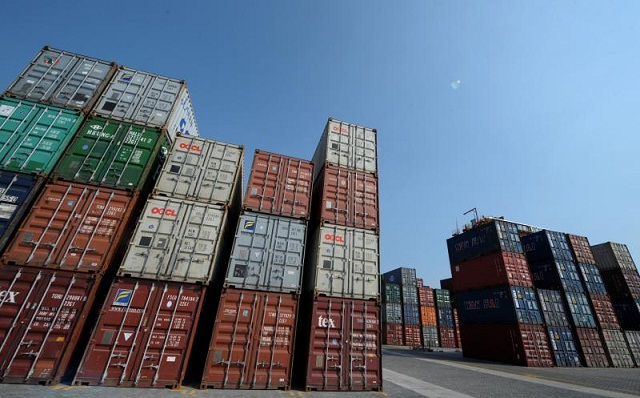CAIRO: A global lurch into protectionism could make the financial crisis much worse, said acting mission director of USAID-Egypt on Thursday.
“Amid challenging times that we live in today.we’ve seen the spectrum of trade protectionism rearing its ugly head almost everywhere including my own country [US], said John Groarke.
Protectionism refers to efforts to salvage jobs by blocking imports or encouraging exports unfairly.
“Free trade is a very important factor in generating economic growth. Let’s hope that we don’t see any protectionism in the coming years.
Economists worldwide have raised concerns that erecting trade barriers to defend jobs may deepen the global recession by making it harder for other countries to sell their goods abroad, as occurred during the 1930s Great Depression.
The latest International Monetary Fund (IMF) forecast sees world trade contracting by 2.8 percent this year after growing 4.1 percent in 2008 and 7.2 percent in 2007, a particularly worrying trend as slowing trade growth is now the main depressing factor on world output, Pascal Lamy, director-general of the World Trade Organization (WTO), said recently.
In Egypt, Trade and Industry Minister Rachid Mohamed Rachid warned last month there was a serious trend toward protectionism, as rich countries unveiled subsidies and bailout packages to support local industries.
He called for a more coordinated approach among nations to decide what measures were suitable and which ones should be banned.
“History has shown that trade protectionism hurts world economic growth, and that free trade promotes economic growth, Groarke explained. “In difficult economic times like we have now, countries tend to look at protectionism in order to protect jobs. But that can do more damage to world economy.
In recent months several countries have raised tariffs and subsidies, and a spate of multi-billion dollar stimulus packages and bailouts have been unveiled to jump-start their economies. These rescue packages are under scrutiny by WTO members to see whether they discriminate against free trade on fears that protectionism could worsen the crisis.
Egypt’s trade ministry imposed last week a 10 percent import tariff on cold rolled flat tin sheets, on top of existing duties, to stabilize the local market price after a recent flood of cheaper imports.
“While we believe in open trade, we will not allow local production to be negatively impacted by this de-stocking pattern, Rachid said in a press statement.
Last month, Egypt also imposed anti-dumping duties of LE 500 ($90) a ton on imports of white sugar, on top of the existing 10 percent tariff, to protect the local sugar industry from unfairly priced imports.
“Tariffs are designed to protect domestic production, but I think there is a consensus that a lowering of tariffs would increase trade, Groarke stated.
Meanwhile, the US Congress approved last Friday the $787 billion plan to stimulate the world’s biggest economy, stipulating that public works and building projects funded by the stimulus use only US-made goods, including iron and steel.
“There are some people in America that are calling for more protectionism.[because] a lot of Americans are losing their jobs, for example, those employed in the auto industry, Groarke commented.
The “Buy American provision could mean countries that are not members of an international government procurement agreement would be shut out.
When being asked if the US would sign a free trade agreement with Egypt, Groarke said: “I don’t see that happening in the near-term; but I am confident that with the new Obama administration, at some point a free trade agreement will be signed with Egypt.
Egypt’s exports to the United States and Europe have now slipped to 60 percent compared to 85 percent four years ago. Rachid said that both imports and exports would fall by about 20 percent in value terms this year, after rising 30 percent per year for the past three years.
A number of policymakers have underscored the difficult task of balancing the long-term economic need to keep markets open and the short-term political pressure to defend jobs at home.
Others feared that protectionism would prompt retaliation by other countries and drive down the overall level of trade, destroying output and jobs around the world.
“Hopefully, we won’t go that route, said Groarke.
He spoke during a graduation ceremony held Thursday to celebrate completion of the International Trade Marketing Certification Program, conducted by the Trade Related Assistance Center (TRAC) at the American Chamber of Commerce in Egypt.
The program is a specialized training module that offers performance-based scholarships to fresh graduates through in-depth courses on various trade-related issues such as global markets, import and export skills, trade finance, and trade-related intellectual property rights.
“This program reinvigorates trade.creates more jobs here in Egypt, and also helps promote free trade, he said.
The program is funded by a grant from the USAID and is conducted by TRAC in coordination with the American University in Cairo and the Import-Export Institute in Washington.
This year, the program certified 37 students as professional traders. Around 300 students applied for next year’s program – due to begin in mid-March – out of which 70 have been accepted so far.


